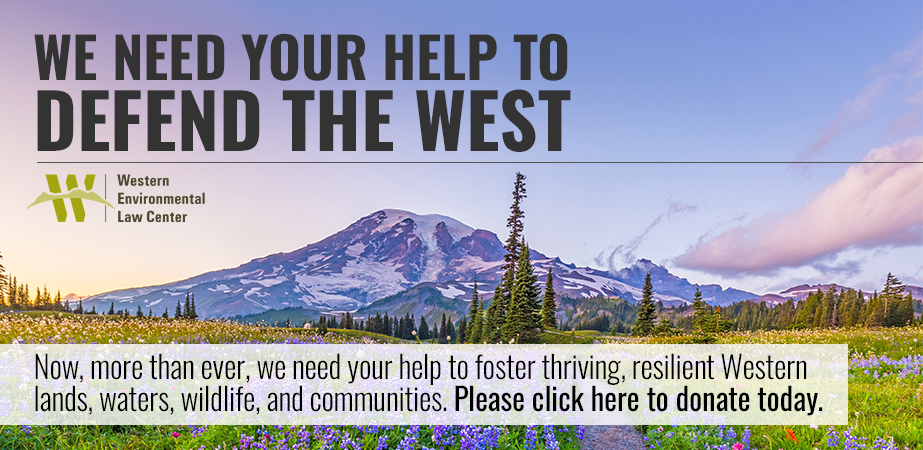Conservation groups and the Bureau of Land Management (BLM) yesterday reached a settlement agreement that will prevent new oil and gas drilling on 58,000 acres of public lands in Montana and the Dakotas pending a new analysis of its potential harm to groundwater and the climate.
The agreement resolves a 2021 lawsuit challenging the Trump administration’s failure to address the harm from oil and gas extraction in eastern Montana and the Dakotas. As part of its new environmental analysis, BLM will reassess whether to uphold the leases sold between July 2019 and September 2020.
“As long as the Bureau of Land Management keeps its head in the sand about the cumulative nature of climate impacts, we’ll keep forcing them back to the drawing board,” said Melissa Hornbein, senior attorney for the Western Environmental Law Center. “We’re glad that this agreement obliges the agency to reconsider using these public lands in the drought-stricken western U.S. for even more oil and gas drilling.”
“This agreement is a positive step, but the work isn’t done,” said Tom Delehanty, associate attorney with Earthjustice’s Rocky Mountain Office. “BLM will have to take a hard look at these leases’ deleterious effects when it goes back to the drawing board, and we’ll be scrupulous in evaluating whether it complies with its obligations as the steward of our public lands.”
In 2020, conservation groups won a lawsuit overturning BLM’s sale of 145,000 acres of oil and gas leases in Montana and North Dakota. Yesterday’s agreement holds the agency accountable for its legal duties.
“This is the second time in recent years that BLM failed to protect water resources and consider the climate when leasing oil and gas in Montana. Let’s hope this is the last time we have to take BLM to court to do what the law requires,” said Derf Johnson, deputy director for the Montana Environmental Information Center. “The climate and Montana’s scarce water resources are in dire straits, and there is no time to dally, especially when a court has previously found in favor of protecting Montana’s public lands and water resources. We are pleased that BLM finally realized that it has an important role to play in protecting our public lands, waters, and the climate.”
“This agreement opens the door for the Biden administration to undo the Trump administration’s recklessness and disregard to the public interest,” said Jeremy Nichols, WildEarth Guardians’ climate and energy program director. “Oil and gas leasing is completely at odds with climate action, we applaud the administration for agreeing to do the right thing.”
“Oil and gas extraction on public lands contributes nearly a quarter of all greenhouse gas emissions from the United States,” said Waterkeeper Alliance CEO Marc Yaggi. “Although we are pleased that BLM has agreed to undertake more comprehensive environmental assessment as a result of our case, there remains a fundamental disconnect between scientific evidence and public policy. BLM knows that these emissions will contribute to climate-fueled weather events as well as impacts to water availability, human health, fisheries, and food production. Management of our federal lands must fully weigh this reality, or we will miss our chance to avoid climate catastrophe.”
“This agreement gives public lands, wildlife and the climate a welcome respite from the dangerous onslaught of oil and gas extraction,” said Taylor McKinnon with the Center for Biological Diversity. “Now, as the West burns and its rivers dry, the Biden administration needs to bring climate-destroying federal oil and gas production to a swift, orderly end.”
“We can no longer ignore the devastating effects continued fossil fuel leasing has on the health of our communities and the future of our planet,” said Dan Ritzman, director of the Sierra Club’s Lands Water Wildlife Campaign. “We remain hopeful that this agreement will chart the way forward for public land management based in science and that serves the interests of people, not oil and gas corporations.”
Several analyses show climate pollution from the world’s already producing fossil fuel developments could push warming past 1.5 degrees Celsius if fully developed. Avoiding such warming requires ending new investment in fossil fuel projects and phasing out production to keep as much as 40% of already-developed fields in the ground.
BLM’s commitment to conduct an adequate analysis is especially meaningful in light of a decision by a federal judge in Wyoming that affirmed the Biden administration’s decision to postpone oil and gas lease sales in early 2021. U.S. District Judge Scott Skavdahl held that the federal government has broad authority to postpone sales to address environmental concerns. The judge rejected arguments by industry and Wyoming and found that BLM acted within its legal authority under the Mineral Leasing Act, National Environmental Policy Act (NEPA), and other laws when it postponed lease sales to ensure that it fully considered the environmental harms they could cause. The court also held that industry and Wyoming lacked standing to challenge the postponement.
Thousands of organizations and communities from across the U.S. have called on President Biden to halt federal fossil fuel expansion, phase out production consistent with limiting global warming to 1.5 degrees Celsius, and develop new rules under long-ignored legal authorities to serve those goals.
Plaintiffs WildEarth Guardians, Montana Environmental Information Center, Center for Biological Diversity, Sierra Club, and Waterkeeper Alliance are represented in this lawsuit by Earthjustice and the Western Environmental Law Center.
Contacts:
Melissa Hornbein, Western Environmental Law Center, 406-471-3173, gro.w1752885184alnre1752885184tsew@1752885184niebn1752885184rohm1752885184
Perry Wheeler, Earthjustice, 202-792-6211, gro.e1752885184citsu1752885184jhtra1752885184e@rel1752885184eehwp1752885184
Jeremy Nichols, WildEarth Guardians, 303-437-7663, gro.s1752885184naidr1752885184aught1752885184raedl1752885184iw@sl1752885184ohcin1752885184j1752885184
Anne Hedges, Montana Environmental Information Center, 406-461-9546, gro.c1752885184iem@s1752885184egdeh1752885184a1752885184
Taylor McKinnon, Center for Biological Diversity, 801-300-2414, gro.y1752885184tisre1752885184vidla1752885184cigol1752885184oib@n1752885184onnik1752885184cmt1752885184
Medhini Kumar, Sierra Club, gro.b1752885184ulcar1752885184reis@1752885184ramuk1752885184.inih1752885184dem1752885184
Lori Harrison, Waterkeeper Alliance, 703-216-8565, gro.r1752885184epeek1752885184retaw1752885184@nosi1752885184rrahl1752885184

